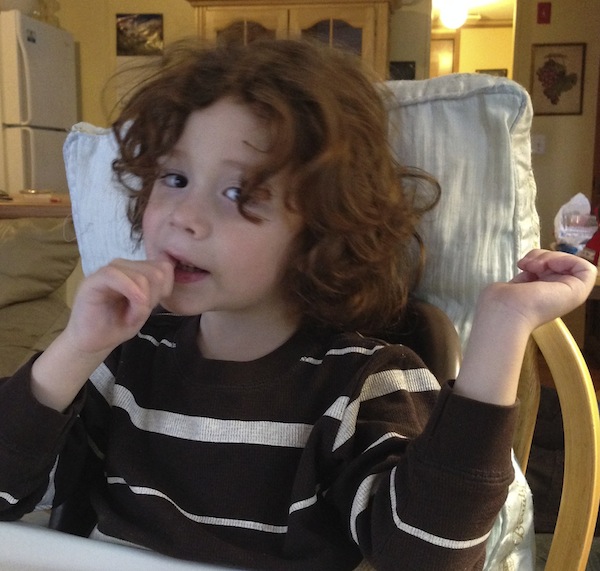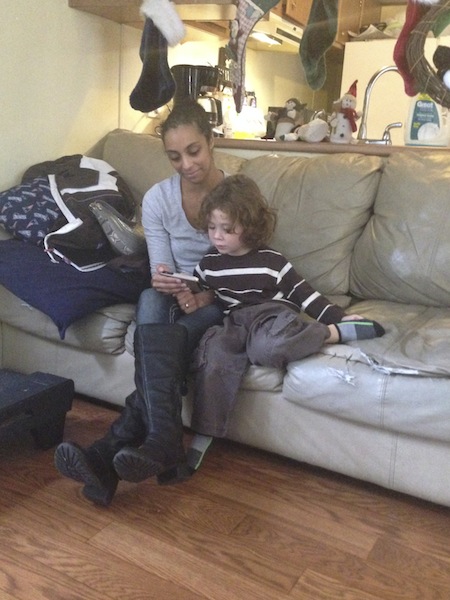Johnny Somma, who’s now 4 ½, was born a month early. Six pounds, 13 ounces of perfection. Great color boasts his mother and an Apgar score of 9.9.
By 18 months, he was saying Momma, Daddy and Sissy — his sister Carly was four when Johnny was born. When prompted, he would point to his eyes and nose and mouth and clap his hands. He was just starting to walk — a bit late, but like other babies his age, he was into everything.
And then, almost overnight, the light in Johnny’s eyes dimmed. “We put him down for a nap,” says his mother Coleen, “and he woke up and he was really, really groggy. I remember thinking poor baby, maybe he’s getting sick.”
Over the next few months, a cascade of unsettling things began to happen. “He started ignoring us,” says Coleen. “I would clap beside him, whisper into his ear, call his name and nothing. He started to display a rocking motion, with one leg forward and one leg back — constantly. All of a sudden, he was turning toys over and playing with the wheels. Just spinning and spinning them. He used to putt along on the floor on his knees, but he was just not interested. He wouldn’t engage with Carly anymore and when the dog licked his face he wouldn’t respond. I got scared.”
She knew in her gut what might be wrong, but fear kept Coleen and her son isolated for several months. She didn’t want other people to notice the change and she wasn’t ready to hear the truth. John Somma didn’t share his wife’s suspicions — at first. “I didn’t suspect,” he says. “We never had a boy before and he had been doing everything normal before that. But like my wife said, it just all stopped.”
The diagnosis
When Johnny was two years, three months old, Coleen finally brought him to his pediatrician’s office, where there was no more hiding. “The rocking motion was clear and present,” she describes. “I was crying and I said I know.”
What she knew is that Johnny had been showing signs of autism or autism spectrum disorder. The spectrum includes a wide range of symptoms, skills and levels of impairment or disability, according to the National Institute of Mental Health. Some children are mildly impaired, while others are severely disabled.
Johnny has delayed milestones. For instance, he’s only just beginning to show an interest in potty training. But the fact that he is interested at all is a blessing. When you have a child with autism, the tiniest of successes is a monumental blessing.
Getting help
The Somma family has not faced the challenges of the past two years since Johnny’s diagnosis alone. In the beginning, Child Development Services (CDS) sent a behavioral specialist from Easter Seals Maine to their home to help them learn new ways to communicate with Johnny.
They practiced opening a jar of bubbles. First, the behavioral specialist showed Johnny the bottle, then let him help unscrew the cap, which he loved doing. He told him there was a surprise inside. “And he pulls out the wand and blows,” says Coleen. “All of a sudden, Johnny’s eyes just light up because it’s a surprise he didn’t expect.”
They’ve used the technique successfully ever since, even setting up the Christmas tree. First they brought out the box (an artificial tree) for about three hours. “He’s over there investigating it,” describes Coleen. “Then we put it together but didn’t turn the light on. We let him adjust to that. He walked right up to it and got into unwrapping wrapping the ornaments. We wrap them in tissue paper. He liked the noise and unwrapping each one to see the surprise inside.”
Early intervention services were key to Johnny’s progress. Now he attends the NorthStar Learning Center at Easter Seals Maine in Portland, where he has made even more strides.
“He is saying things now that he was never saying before,” boasts his mother. “He’s loving. He’s coming to us and he’s got intelligence — he’s got a lot of intelligence. He’s singing words he hears on tv, he’s responding appropriately and he can count to 10.”
“I write down every word that comes out of his mouth,” says John, showing me several notebooks. “From last year to this we’ve seen a lot more words.”
Johnny may have progressed amazingly, but according to his mom and dad, he’s got the energy of between five and ten boys rolled into one! For one thing, he usually doesn’t sleep through the night.
He gets up in the middle of the night,” says John, “and he does a lot of running around, so you have to be on the alert about all of the things in your house that he will get into. It’s very scary. It’s dark and he’s running around.”
“Last summer he was getting up in the night and grabbing people’s toothbrushes and giving them a swirl in the toilet,” laughs Coleen.
Under the circumstances, it may seem surprising that Coleen still has a sense of humor or that John seems so laid back. After all, if Johnny doesn’t sleep, neither do they and even though he is in school five days a week and making great progress, their lives revolve around their son. Few people fully understand what it’s like. “There’s no such thing as getting a babysitter and going out for the night,” says Coleen. “They have to be fully trained. Seriously. He’s non-stop. There’s nobody to trust at this point.”
But with the help of Danielle Whitehouse, respite is on the way. She’s a child case manager for Easter Seals Maine and is working with NAMI (National Alliance on Mental Illness) to find and train someone to watch over Johnny for at least a few hours a month. Each family’s needs are different, says Danielle and her job is to find out what would make their lives easier. “Is it having someone come in and work on mealtimes so the child can sit up at the dinner table and eat together as a family or is it that you just need to go see a movie or take a walk? Or do you need some extra therapies outside of school? A lot of parents don’t have any idea what resources are out there that could help.”
The biggest blessing
What Coleen and John need is some time away from home to spend with each other and with their daughter Carly. When it happens it will be a blessing — among so many others. The biggest blessing of all may be Johnny himself, who as he tests his family every single day, seems to bring out the best in them.
If you have any words of encouragement or wisdom or would like to share your own blessings, please add your comment to the box at the bottom of the page. Thank you.



As a part-time bus driver serving all age clients, including autism spectrum pre-school kids, I can attest that these schools and case workers do tremendous work. The early recognition and intervention is absolutely critical. When they learn that they can communicate, the world opens up. The people who are helping them and their families, are underpaid miracle workers.
I agree Jeffrey. Thanks for taking the time to comment. I didn’t know you also drive a bus!
I love your article on autism, Diane. What a lucky boy Johnny is to have Colleen and John for parents. There are so many wonderful things happening today for children with autism, including all sorts of new resources, including technology, an area where many children will excel.
Thank you Dean. As for technology, Johnny knows his way around a tablet, which has helped him learn words and ways to communicate. And when I was interviewing his parents, he took my phone and started scrolling through my pictures — he knew just what to do!
Diane, thank you so much for the wonderful article. As a professional in this field I love to hear stories about the hard work case managers and early intervention teachers do and the wins each family experiences. My own son has autism and the early intervention support from CDS and Easter Seals have made such a positive difference for him and our family. Thank you for highlighting this!
April, thank you for your comment. There’s nothing I like more than sharing a story that might help someone else.